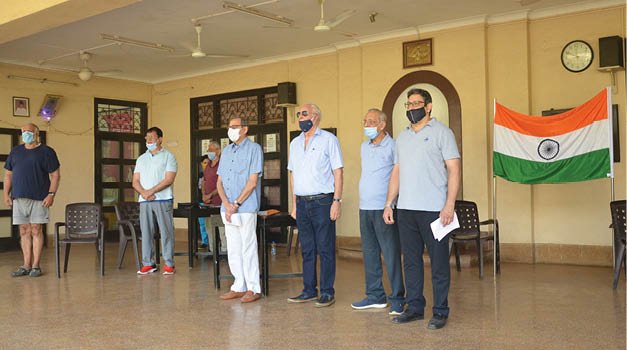Guaranteed to Make You Smile: Drs. Mobed and Parsi Find Great Success
Dr. Fardad Mobed and Dr. Lily Parsi certainly have a lot in common.
Both are scholars, which goes without saying. They hold degrees in engineering: Dr. Mobed, a Bachelor’s in Electrical Engineering, Dr. Parsi, three advanced degrees in Civil, Water Resources, and Computer System Engineering.
Both attended dental school in the Boston area. Dr. Mobed completed his dental training at Boston University while Dr. Parsi studied at the Tufts University School of Dental Medicine.
But perhaps, most significantly, they share the same home address. Dr. Mobed and Dr. Parsi are husband and wife, the parents of two children.
And they have been practicing dentistry together at their state-of-the-art offices, Northgate Dental, located at 603 Broadway that has been in existence for 27 years. Dr. Mobed is an endodontist specializing in root canal surgery. Dr. Parsi is a pedodontist specializing in children’s dentistry.
Dr. Mobed began his practice in 1992 at the Northgate Shopping Center before moving to Broadway. Dr. Parsi joined the practice in 2008. They also have a dental practice in Brookline.
Yes, they do work side by side in the Revere office, though as Dr. Parsi states, “I treat the children. He treats mostly adults.”
Of course, everyone asks the question, “What’s it like for a couple to work together?”
“It’s great – we really support each other quite a bit,” said Dr. Parsi. “I feel it’s good to know that you can trust the other person 100 percent.”
Dr. Samantha Bogle is the orthodontist at Northgate. Dr. Joey Chang is the oral surgeon and the director of the pre-doctoral program at Tufts School of Dental Medicine.
Do Dr. Mobed and Dr. Parsi talk about dentistry at home during dinner?
“Unfortunately, a lot,” Dr. Parsi said, smiling.
“We go to dental conferences together but we attend different lectures,” added Dr. Mobed.
The dentists have stayed on top of the major technological advances in their profession and their offices feature the latest state-of-the-art equipment.
“I think one of the biggest changes have been in CT scans and microscopes, and everybody gets white fillings instead of silver fillings,” said Dr. Mobed.
Dr. Parsi said preventive care should begin early. “The primary goal in pediatric dentistry is to prevent cavities, so we want to see children as early as 6 months old, but no later than the first year of age,” said Dr. Parsi. “Because the objective is to teach the parents how to take care of their children, ideally so the children will never have cavities, rather than seeing them at the time when there are already cavities in the mouth.”
Dr. Parsi said Northgate wants to be “a dental home for families, so patients know where to go when there are issues, but hopefully we can prevent these issues from happening.”
27 years in Revere
Dr. Mobed has been a practicing dentist in Revere for 27 years. He has treated two generations of families who have been coming to Northgate Dental.
“I like the people,” said Dr. Mobed. “It’s a good community and they’re appreciative of what you do for them.”
“I’ve had patients who I saw when they were very little, and now they now see him,” said Dr. Parsi. “Depending on the patient’s personality, anywhere between the ages 15-18, they’re ready to see the adult dentist.”
She is proud to see her patients dedicating themselves to dental care and prevention.
“I’m especially happy to see the children whom I’ve seen six months old, because they end up being very healthy, and it makes me sad when somebody whom I’ve never seen, comes in to the office and they have major needs. I’m glad we’ve made such a strong connection to families that we’ve known for a long time. It’s very satisfying.”
Dr. Parsi recommends that her patients have regular dental check-ups every six months.
Interestingly Dr. Mobed came to the United States from Iran 40 years ago with the goal of becoming a professional soccer player.
He accomplished that goal, earning a spot on the Boston Teamen professional team that was based in Framingham.
One of his fondest soccer memories was playing for an Iranian team that had an exhibition game in that country against Brazil and Pele, arguably the greatest soccer player in history.
“In 1978, Brazil came to Iran for some exhibition games when Pele was at the top of his game and was most famous at that time,” recalled Dr. Mobed. “I was fast, but too skinny, otherwise I wouldn’t be a dentist now.”
But fortunately for their many patients, Dr. Fardad Mobed and Dr. Lily Parsi are dentists now and they look forward to continuing their successful partnership at Northgate Dental for many years to come.
Mass. Dental Society shares five ways to show kids’ teeth some love during children’s dental health month
February is not just a time to show love to your sweetheart on Valentine’s Day, it also marks National Children’s Dental Health Month. This month-long national health observance, sponsored by the American Dental Association, is designed to raise public awareness about the importance of children’s oral health.
To help promote the benefits of establishing good oral health habits at an early age, the Massachusetts Dental Society (MDS) offers parents, caregivers and teachers these five tips:
• Oral health care should start from day one. It’s essential to begin oral health care as soon as your baby is born. Clean his or her gums gently with a clean gauze pad or washcloth after each feeding. Parents should brush their baby’s teeth gently with a soft-bristled toothbrush and a small amount of water as soon as the first tooth appears, typically between six months and one year.
• Children’s teeth should be brushed for at least two minutes, at least twice a day. While it is okay to let children “take a turn,” parents should do the actual brushing until manual dexterity is good enough to do an effective job in removing all plaque on the teeth. Use a fluoridated toothpaste and a soft-bristled toothbrush. And brushing alone does not remove the food particles and plaque that builds up between the teeth, so flossing is critical. Flossing should occur as soon as the teeth are close together and any two are touching, usually by the age of four. Using a smooth-coated, mint-flavored floss will appeal more to young mouths.
• Certain foods and drinks can affect children’s teeth more than others. Sticky candy and snacks like gummy worms, licorice, fruit snacks and even raisins have a high sugar content and are the worst offenders when it comes to causing tooth decay, otherwise known as cavities. Excessive consumption of soda and sweetened sports drinks can also cause decay. Children should drink water, low-fat milk, and all-natural fruit juices. Also be mindful of sugary chewing gum. If you let your child chew gum, it should always be sugar-free. The best gum to chew has xylitol, which has been shown to help prevent cavities.
• There’s no need to be overly nervous about the oral implications of thumb sucking and pacifier use. These are common habits and a normal, soothing reflex for babies and toddlers. Most children will stop sucking their thumb between the ages of 2 and 4, and typically no harm is done to their teeth or jaws. However, some children who repeatedly suck on a finger or a pacifier for long periods of time may push their upper front teeth toward their lip, or their front teeth may not come in properly. Positive measures, such as praise or small, non-food rewards such as stickers, should be given to encourage children to stop. Negative reinforcement or constant nagging by parents can have the opposite effect.
• Regular dental visits will help avoid potential problems. Dental visits are very important to ensure that children’s teeth are coming in properly and do not show signs of decay. Children should receive an examination and cleaning by their dentist every six months to avoid potential problems. The American Academy of Pediatric Dentistry and the American Academy of Pediatrics both recommend that a child’s first visit to the dentist should be six months after the eruption of the first tooth, or by the age of 1. However, if parents have a specific concern, they should not hesitate to contact their dentist prior to this guideline.
“Attitudes and habits established at an early age are critical to maintaining good oral health throughout life,” says MDS President Dr. Howard Zolot. “Dental decay is the single most common chronic childhood disease in the United States. With good nutrition, proper care, and regular dental visits, children can maintain healthy mouths—and healthy smiles.” Visit massdental.org/baby-oral-health to download The Mouths of Babes brochure, and follow #NCDHM on social media for more children’s oral health tips.





